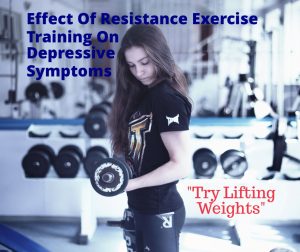Effect of Resistance Exercise Training on Depressive Symptoms
TAKE-HOME MESSAGE
* This study analyzed 33 randomized controlled trials to evaluate the association between resistance exercise training and depressive symptoms. The study found that resistance exercise training was associated with a decrease in depressive symptoms. However, the authors observed significant variability in the quality of trials analyzed.
* The study concluded that, although resistance exercise training seems to be effective in reduction of depression in adults, better quality randomized controlled trials in terms of study blinding are needed to better assess the effects of resistance exercise training .
It’s commonly accepted that encouraging depressed patients of any age to engage in physical activity and exercise is considered good advice and a valuable adjunct to treatment. But, most such advice from health care providers emphasizes aerobic exercise. I frequently hear my colleagues (and myself) advising patients to “Get out of the house, take a walk, go to the park, bike…” So, why isn’t there more emphasis on anaerobic exercise?
This research points out that one can confidently recommend resistance training because it has a meaningful effect on reducing depression in patients with mild to moderate depression. The meta-analysis indicates that the amount of resistance training did not matter, the effects were similar for men and women who were young, middle-aged or elderly. And, participating in resistance training did not have to result in gains in physical strength for there to be evidence of improved mood.
Perhaps clinicians are reluctant to prescribe resistance training due to protective beliefs that depressed patients can’t be pushed too hard. “Walk” seems more doable than “jog’; “work outside” seems more achievable than “try lifting weights.” But consider how elements associated with resistance training such as goal setting, a structured routine, mastery, progressive success, social activity and accountability to others (such as work-out buddies) are all goals for depressed patients.
Resistance training is not a stand-alone treatment for depression nor will it work for all depressed patients. However, this study provides clinicians enough evidence to permit a discussion with patients about the value of resistance-type exercise for alleviating the suffering of depression. When encouraging anaerobic exercise, it is important to obtain a baseline measure of depression (e.g., PHQ-9), establish a routine that starts slow, and to choose goals which are progressive (acknowledging some disruptions). Unfortunately, the study does not address potential interactions or complications between increased resistance training and various psychotropic medications which will need to be discussed with patients.
IMPORTANCE
The physical benefits of resistance exercise training are well documented, but less is known regarding the association of resistance exercise training with mental health outcomes. To date, no quantitative synthesis of the antidepressant effects of resistance exercise training has been conducted.
OBJECTIVES
To estimate the association of efficacy of resistance exercise training with depressive symptoms and determine the extent to which logical, theoretical, and/or prior empirical variables are associated with depressive symptoms and whether the association of efficacy of resistance exercise training with depressive symptoms accounts for variability in the overall effect size.
STUDY SELECTION
Randomized clinical trials included randomization to resistance exercise training (n = 947) or a nonactive control condition (n = 930).
DATA EXTRACTION AND SYNTHESIS
Hedges d effect sizes were computed and random-effects models were used for all analyses. Meta-regression was conducted to quantify the potential moderating influence of participant and trial characteristics.
MAIN OUTCOMES AND MEASURES
Randomized clinical trials used validated measures of depressive symptoms assessed at baseline and midintervention and/or postintervention. Four primary moderators were selected a priori to provide focused research hypotheses about variation in effect size: total volume of prescribed resistance exercise training, whether participants were healthy or physically or mentally ill, whether or not allocation and/or assessment were blinded, and whether or not the resistance exercise training intervention resulted in a significant improvement in strength.
RESULTS
Fifty-four effects were derived from 33 randomized clinical trials involving 1877 participants. Resistance exercise training was associated with a significant reduction in depressive symptoms with a moderate-sized mean effect ∆ of 0.66 (95% CI, 0.48-0.83; z = 7.35; P < .001). Significant heterogeneity was indicated (total Q = 216.92, df = 53; P < .001; I2 = 76.0% [95% CI, 72.7%-79.0%]), and sampling error accounted for 32.9% of observed variance. The number needed to treat was 4. Total volume of prescribed resistance exercise training, participant health status, and strength improvements were not significantly associated with the antidepressant effect of resistance exercise training. However, smaller reductions in depressive symptoms were derived from randomized clinical trials with blinded allocation and/or assessment.
CONCLUSIONS AND RELEVANCE
Resistance exercise training significantly reduced depressive symptoms among adults regardless of health status, total prescribed volume of resistance exercise training, or significant improvements in strength. Better-quality randomized clinical trials blinding both allocation and assessment and comparing resistance exercise training with other empirically supported treatments for depressive symptoms are needed.
At Botanica Medica our Naturopaths are well aware of the importance of exercise, a good diet and the effect it can have on your life both physically and mentally. They come across lots of interesting studies and are always updating their knowledge. If you would like to make an appointment with one of our Naturopaths call Botanica Medica on 8271-1827 today. They are only to happy to share the knowledge they have gained through their studies and patient outcomes, and get you feeling better. Botanica Medica is located at 97 Glen Osmond Road, Eastwood and appointments are available Monday to Saturday including some after hours.
DATA SOURCES
Articles published before August 2017, located using Google Scholar, MEDLINE, PsycINFO, PubMed, and Web of Science.
References
Brett R. Gordon, MSc1; Cillian P. McDowell, BSc1; Mats Hallgren, PhD2; et al
Jacob D. Meyer, PhD3; Mark Lyons, PhD1; Matthew P. Herring, PhD1,4
Author Affiliations
JAMA Psychiatry. 2018;75(6):566-576. doi:10.1001/jamapsychiatry.2018.0572
Primary Care Written by Dennis J Butler PhD
Artwork created in Canva


Recent Comments